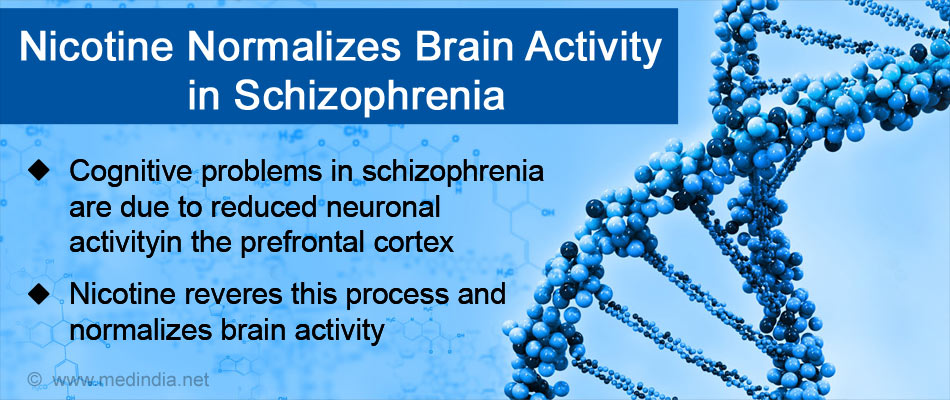
- Schizophrenia occurs more commonly in people who have a variation in a gene called CHRNA5.
- This variant in gene CHRNA5, leads to hypofrontality which causes most cognitive problems associated with schizophrenia.
- Nicotine is found to compensate for that genetic impairment.
Among people suffering from schizophrenia, by age 30, 9 out of 10 men, but only 2 out of 10 women, will manifest the illness.
Risk of suicide is higher in schizophrenia. Approximately one-third will attempt suicide and, eventually, about 1 out of 10 will take their own lives.
Previous studies have suggested that people with a variation in a gene called CHRNA5 are more likely to have schizophrenia, but the mechanism for that association has remained unclear. People with that variant are also more likely to smoke.
"Our study provides compelling biological evidence that a specific genetic variant contributes to risk for schizophrenia, defines the mechanism responsible for the effect and validates that nicotine improves that deficit," said Jerry Stitzel, a researcher at the Institute for Behavioral Genetics (IBG).
"Basically the nicotine is compensating for a genetically determined impairment," says Stitzel. "No one has ever shown that before."
Hypofrontality is believed to be the main cause of many of the cognitive problems like trouble paying attention, remembering things, making decisions and understanding verbal explanations asscoaited with schizophrenia.
Study
The researchers wanted to know if a variant in the CHRNA5 gene lead to hypofrontality and if nicotine interrupts this effect.
The research team used state-of-the-art brain imaging technologies to see if mice with the CHRNA5 gene variant had hypofrontality. The mice were tested positive for hypofrontality.
The researchers then conducted behavioral tests to see if the mice shared key characteristics of schizophrenics, like being unable to suppress a startle response and being averse to social interaction. The mice displayed the characteristics of schizophrenics.
The results helped to prove that the gene variant likely plays a role in schizophrenia by causing hypofrontality.
Use of nicotine appeared to reverse this effect in the mice, normalizing brain activity by acting on nicotinic receptors in regions of the brain key to healthy cognitive function.
The research could ultimately have broad applications for drug development in the mental health field as hypofrontality is also associated with addiction and other psychiatric conditions, such as attention deficit hyperactivity disorder and Bipolar disorder.
"This defines a completely novel strategy for medication development," says lead author Maskos. Early stage research is already under way to develop drugs that act on nicotinic receptors.
Another potential application of the research "Identifying behavioral deficits associated with this mutation can be used for diagnostic or predictive work in schizophrenia," says Hoeffer.
Researchers hope that their findings will help in developing new, non-addictive, nicotine-based treatments for schizophrenia.
The findings are published online in the journal Nature Medicine.
References
- Burden of Mental Illness - (https://www.cdc.gov/mentalhealth/basics/burden.htm)
- Uwe Maskos et al. Nicotine reverses hypofrontality in animal models of addiction and schizophrenia. Nature Medicine ; (2017) doi:10.1038/nm.4274
Source-Medindia














